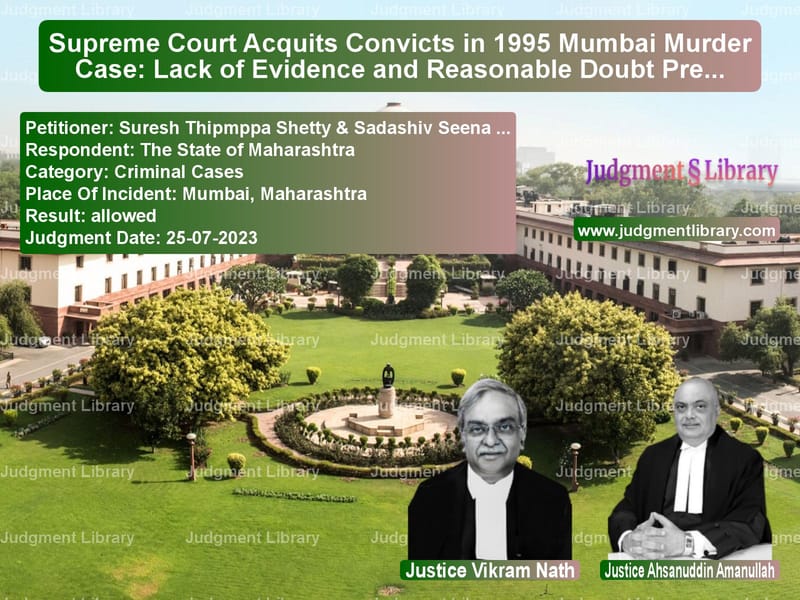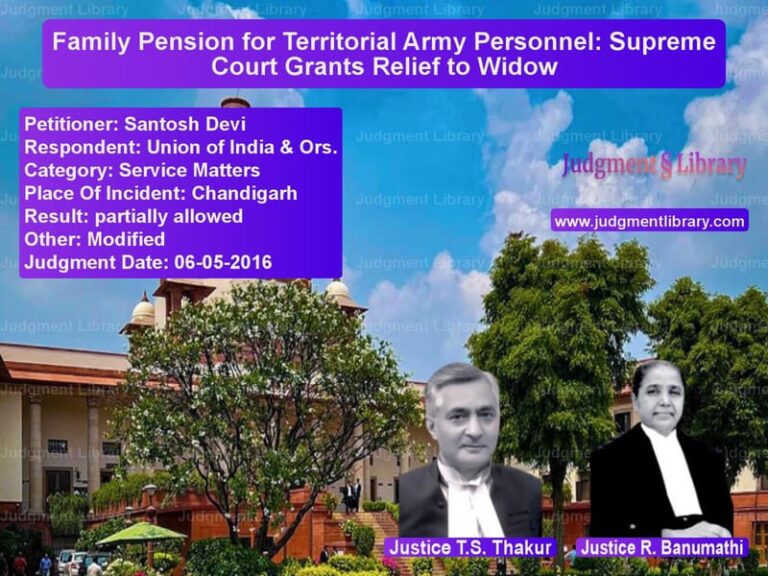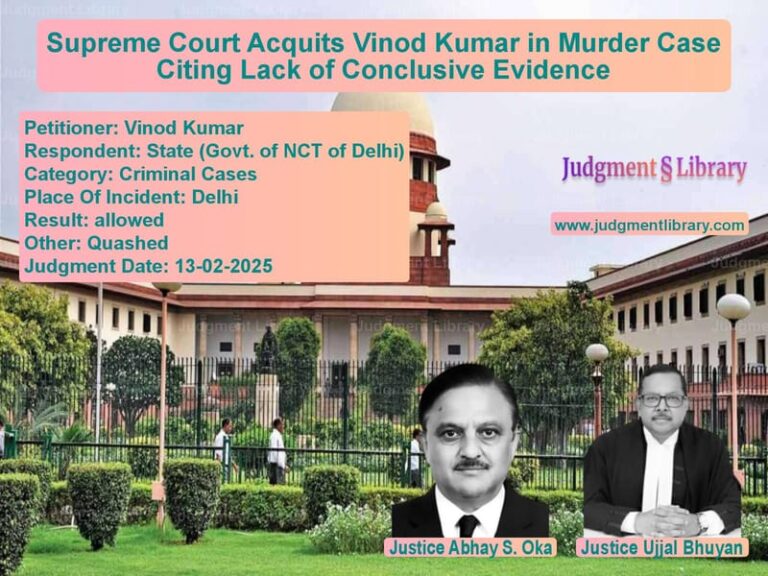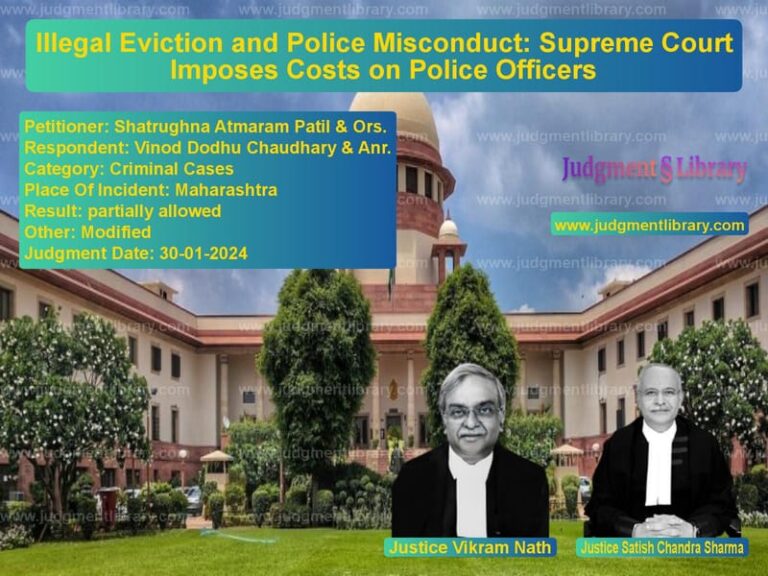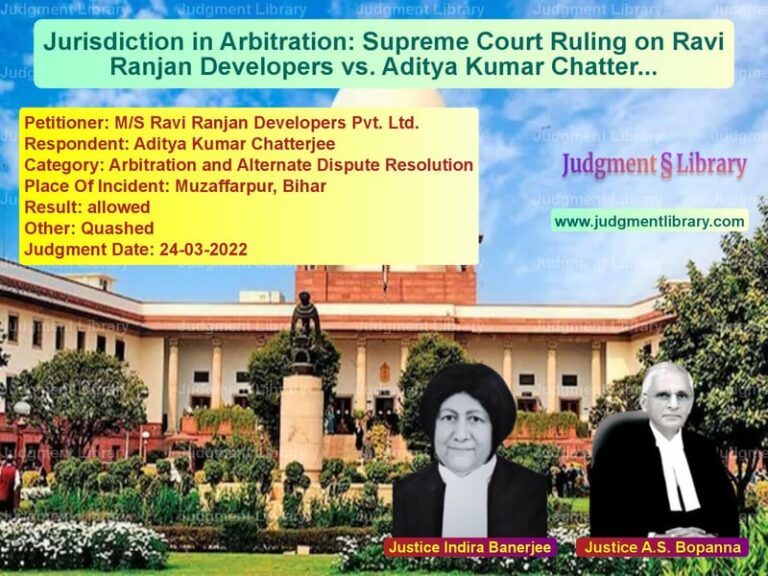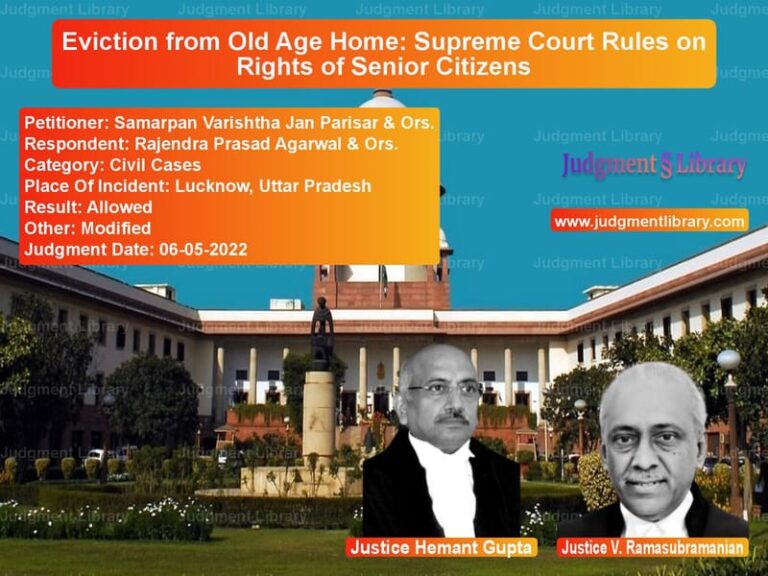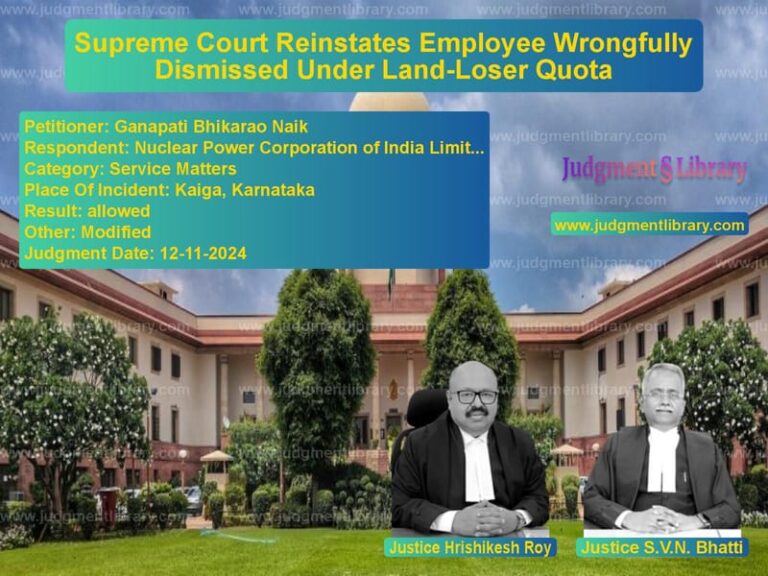Supreme Court Acquits Convicts in 1995 Mumbai Murder Case: Lack of Evidence and Reasonable Doubt Prevail
The case of Suresh Thipmppa Shetty & Sadashiv Seena Salian v. The State of Maharashtra pertains to a brutal murder that took place in Mumbai in 1995. The Supreme Court recently overturned the convictions of the appellants due to lack of direct evidence and reasonable doubt, highlighting the importance of procedural fairness in criminal trials.
Background of the Case
The case revolves around the murder of Mahendra Pratap Singh, a businessman involved in the petroleum industry. The prosecution alleged that business rivalry between the deceased and two accused, identified as A1 and A7, led to a conspiracy to abduct and murder him.
Key Events Leading to the Case
- September 1994: A1, A2, and A7 were in Colaba police lockup. The prosecution claimed they conspired to murder Mahendra Pratap Singh.
- May 12, 1995: The deceased, Mahendra Pratap Singh, was lured to a hotel under the pretext of a business meeting.
- He was taken in a car, accompanied by an unknown shooter, and subsequently shot dead.
- May 13, 1995: An FIR was registered at Panvel police station.
- Multiple accused, including A1, A2, A3, A4, and A7, were charged with conspiracy and murder.
Trial Court’s Verdict
The Sessions Court convicted A2 and A4 under Section 120B and Section 302 read with Section 120B of the Indian Penal Code (IPC). The punishments were as follows:
- A2 (Sadashiv Seena Salian): Five years’ rigorous imprisonment for conspiracy, life imprisonment for murder, and a fine of ₹50,000.
- A4 (Suresh Thipmppa Shetty): Life imprisonment and a fine of ₹50,000.
However, the main accused, A1 and A7, who were alleged masterminds of the conspiracy, were acquitted due to lack of evidence.
Appeal in the Bombay High Court
The convicted individuals, along with the state of Maharashtra (which appealed against the acquittal of A1 and A7), challenged the verdict in the Bombay High Court.
The High Court upheld the Sessions Court’s decision, ruling that circumstantial evidence was sufficient to prove conspiracy, even in the absence of direct participation in the crime.
Arguments Before the Supreme Court
Appellants’ Arguments
The defense contended that:
- The prosecution’s case relied purely on circumstantial evidence without any direct link to the accused.
- The conspiracy theory collapsed when A1 and A7, the alleged masterminds, were acquitted.
- There was no evidence to prove the appellants’ active role in the conspiracy.
- The eyewitness testimony of PW1 (the deceased’s uncle) was unreliable, as he fled from the scene but did not immediately inform the police.
- PW7, who claimed to have witnessed the murder from 150 feet away, came forward six months after the incident, raising doubts about the credibility of his statement.
- No forensic evidence linked the accused to the crime, as the murder weapon was never recovered.
Respondent’s Arguments
The State of Maharashtra argued that:
- The conspiracy was proven based on circumstantial evidence and testimonies of hotel staff and other witnesses.
- The appellants played a key role in luring the deceased to the location where he was murdered.
- There were financial transactions linked to A2 that indicated involvement in the crime.
- Legal precedents supported that conspiracy could be established through indirect evidence.
Supreme Court’s Ruling
The Supreme Court found significant gaps in the prosecution’s case. The key observations by the Court included:
“Neither appellant was in the car when the deceased was shot, nor was there any direct evidence linking them to the planning or execution of the crime.”
The Court emphasized that:
- There was no forensic or direct evidence proving the involvement of A2 and A4.
- PW1’s actions were suspicious; instead of informing the police, he first went to a family friend’s house.
- PW7’s testimony was unreliable as he came forward six months later.
- Since A1 and A7, the alleged masterminds, were acquitted, the conspiracy theory lacked credibility.
- The prosecution failed to establish beyond reasonable doubt that the accused were part of a criminal conspiracy.
Judgment Excerpts
“A conviction can only be sustained in the absence of reasonable doubt. The presumption of innocence in favor of the accused and insistence on the Prosecution to prove its case beyond reasonable doubt are not empty formalities.”
The Supreme Court ruled that the principles of fairness and justice demanded acquittal, as reasonable doubt existed in the case against A2 and A4.
Final Decision
The Supreme Court acquitted both appellants and overturned the previous convictions, ruling:
“We see no cogent evidence linking the appellants to the crime. The benefit of doubt must be given to the accused.”
The Court directed the release of the accused and ordered the return of any fines paid.
Conclusion
The judgment underscores the fundamental principle that criminal convictions must be based on concrete evidence rather than suspicion. The Supreme Court reaffirmed the right to a fair trial and the necessity of proving guilt beyond reasonable doubt.
Petitioner Name: Suresh Thipmppa Shetty & Sadashiv Seena Salian.Respondent Name: The State of Maharashtra.Judgment By: Justice Vikram Nath, Justice Ahsanuddin Amanullah.Place Of Incident: Mumbai, Maharashtra.Judgment Date: 25-07-2023.
Don’t miss out on the full details! Download the complete judgment in PDF format below and gain valuable insights instantly!
Download Judgment: suresh-thipmppa-shet-vs-the-state-of-maharas-supreme-court-of-india-judgment-dated-25-07-2023.pdf
Directly Download Judgment: Directly download this Judgment
See all petitions in Murder Cases
See all petitions in Fraud and Forgery
See all petitions in Bail and Anticipatory Bail
See all petitions in Extortion and Blackmail
See all petitions in Judgment by Vikram Nath
See all petitions in Judgment by Ahsanuddin Amanullah
See all petitions in allowed
See all petitions in supreme court of India judgments July 2023
See all petitions in 2023 judgments
See all posts in Criminal Cases Category
See all allowed petitions in Criminal Cases Category
See all Dismissed petitions in Criminal Cases Category
See all partially allowed petitions in Criminal Cases Category

